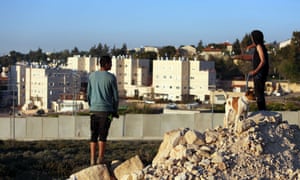 Divide, Conquer, Colonize
Divide, Conquer, Colonize
As US-driven wars plummet the Muslim world ever deeper into
jihadi-ridden failed state chaos, events seem to be careening toward a
tipping point. Eventually, the region will become so profuse a font of
terrorists and refugees, that Western popular resistance to "boots on
the ground" will be overwhelmed by
terror and rage. Then, the US-led empire will finally have the public mandate it needs to
thoroughly and permanently colonize the Greater Middle East.
It is easy to see how the Military Industrial Complex and crony energy
industry would profit from such an outcome. But what about America's
"best friend" in the region? How does Israel stand to benefit from being
surrounded by such chaos?
Tel Aviv has long pursued a strategy of "divide and conquer": both
directly, and indirectly through the tremendous influence of the Israel
lobby and neocons over US foreign policy.
A famous article from the early 1980s by Israeli diplomat and
journalist Oded Yinon is most explicit in this regard. The "
Yinon Plan" calls for the
"dissolution" of "the entire Arab world including Egypt, Syria, Iraq and the Arabian peninsula." Each country was to be made to
"fall apart along sectarian and ethnic lines," after which each resulting fragment would be "hostile" to its "neighbors." Yinon incredibly claimed that:
"This state of affairs will be the guarantee for peace and security in the area in the long run"
According to Yinon, this Balkanization should be realized by fomenting discord and war among the Arabs:
"Every kind of inter-Arab confrontation will assist us in the short run and will shorten the way to the more important aim of breaking up Iraq into denominations as in Syria and in Lebanon."
Sowing discord among Arabs had already been part of Israeli policy years before Yinon's paper.
To counter the secular-Arab nationalist Palestine Liberation
Organization (PLO), Israel supported an Islamist movement in the
Occupied Territories, beginning in the late 70s (around the same time
that
the US began directly supporting the Islamic fundamentalist Mujahideen in Afghanistan).
The Israel-sponsored Palestinian Islamist movement eventually resulted in the creation of Hamas, which Israel also supported and helped to rise.
Also in the late 70s, Israel began fomenting inter-Arab strife in
Lebanon. Beginning in 1976, Israel militarily supported Maronite
Christian Arabs, aggravating the Lebanese Civil War that had recently
begun. In 1978, Israel invaded Lebanon, and recruited locals to create a
proxy force called the "South Lebanon Army."
Israel invaded Lebanon again in 1982, and tried to install a Christian
Fascist organization called the Phalange in power. This was foiled when
the new Phalangist ruler was assassinated. In reprisal, the Phalange
perpetrated, with Israeli connivance, the Sabra and Shatila massacre,
butchering hundreds (perhaps thousands) of Palestinian refugees and
Lebanese Shiites. (See Murray Rothbard's
moving contemporary coverage of the atrocity.)
The civil war that Israel helped foster fractured Lebanon for a decade
and a half. It was Lebanon's chaotic fragmentation that Yinon cited as
the "precedent" and model for the rest of the Arab world.
The US has also long pit Muslim nations, sects, and ethnic groups
against each other. Throughout the 80s, in addition to sponsoring the
Afghan jihad and civil war, the US armed Iraq (including with chemical
weapons) in its invasion of and war against Iran. At the very same time,
the US was also secretly selling arms to the Iranian side of that same
conflict. It is worth noting that two officials involved in the
Iran-Contra Affair were Israel-first neocons Elliot Abrams and Michael
Ledeen. Abrams was convicted (though later pardoned) on criminal
charges.
This theme can also be seen in "
A Clean Break":
a strategy document written in 1996 for the Israeli government by a
neocon "study group" led by future Bush administration officials and
Iraq War architects. In that document, "divide and conquer" went under
the euphemism of "a strategy based on balance of power."
This
strategy involved allying with some Muslim powers (Turkey and Jordan) to
roll back and eventually overthrow others. Particularly it called for
regime change in Iraq in order to destabilize Syria. And destabilizing
both Syria and Iran was chiefly for the sake of countering the
"challenges" those countries posed to Israel's interests in Lebanon.
The primary author of "A Clean Break," David Wurmser, also wrote another
strategy document
in 1996, this one for American audiences, called "Coping with Crumbling
States." Wurmser argued that "tribalism, sectarianism, and
gang/clan-like competition" were what truly defined Arab politics. He
claimed that secular-Arab nationalist regimes like Iraq's and Syria's
tried to defy that reality, but would ultimately fail and be torn apart
by it. Wurmser therefore called for "expediting" and controlling that
inevitable "chaotic collapse" through regime change in Iraq.
Especially thanks to the incredibly
effective efforts
of the neocon Project for a New American Century (PNAC), regime change
in Iraq became official US policy in 1998. Iraq's fate was sealed when
9/11 struck while the US Presidency was dominated by neocons (including
many
Clean Break signatories and
PNAC members) and their close allies.
Beginning with the ensuing Iraq War, the Yinon/Wurmser "divide and conquer" strategy went into permanent overdrive.
Following the overthrow of secular-Arab nationalist ruler Saddam
Hussein, the policies of the American invaders could hardly have been
better designed to instigate a civil war between Iraqi Sunnis and Shias.
The "de-Baathification" of the Iraqi government sent countless secular
Sunnis into unemployed desperation. This was compounded with total
disenfranchisement when the US-orchestrated first election handed total
power over to the Shias. And it was further compounded with persecution
when the US-armed (and Iran-backed) Shiite militias began ethnically
cleansing Baghdad and other cities of Sunnis.
The invasion also unleashed Abu Musab al-Zarqawi, a terrorist who had
previously been holed up hiding from Saddam's security forces. The Sunni
extremist's shootings and suicide bombings of Shia and Shiite shrines,
and the anti-Sunni reprisals they engendered, further divided Iraq along
sectarian lines. Zarqawi's gang eventually grew into Al Qaeda in Iraq
and then ISIS.
All this was the perfect recipe for civil war. And when that civil war
did break out, the US armed forces made reconciliation impossible by
completely taking the Shiite side.
Now in neighboring Syria, the US has been fueling a civil war for the past four years by
sponsoring international Sunni jihadis
fighting alongside ISIS and Syrian Al Qaeda in their war to overthrow
the secular-Arab nationalist ruler Bashar al-Assad, and to "purify" the
land of Shias, Druze, Christians, and other non-Salafist "apostates."
Key co-sponsors of this jihad include the Muslim regimes of Turkey,
Saudi Arabia, Qatar, and the United Arab Emirates. And key allies and
defenders of Assad include such Muslim forces as Hezbollah, Iranian
troops, and Iraqi militias. In some battles in Syria, Iraqi soldiers and
Syrian rebels may each be shooting at the other with American weapons.
Many of the weapons and recruits that were poured into Syria by the US
and its allies ended up going over to ISIS or Al Qaeda. So strengthened,
ISIS then burst into Iraq (where it first emerged during the chaotic US
occupation) and drove the Shiite Iraqi military out of the
Sunni-populated northwest of the country.
Today's "divide and conquer" seems to be the 80s "divide and
conquer" in reverse. In the 80s, the US armed a Sunni-led Iraqi invasion
of Iran. Now, by arming the Iran-led militias that dominate the new
Iraqi military, the US has effectively armed a Shia-led Iranian invasion
of Iraq. Moreover, in the 80s, the US covertly armed the Shiite Iranian
resistance to the Iraqi invasion. Now the US is covertly arming
(through its conduits in the Syrian insurgency) the Sunni Iraqi
resistance to the Iranian invasion.
Jihadi-ridden civil wars have also been fomented in Afghanistan,
Somalia, Yemen, and Libya, the latter following the American overthrow
of yet another secular-Arab nationalist ruler.
In these catastrophes we see virtually everything Yinon and Wurmser
called for. We see Yinon's "inter-Arab confrontation," the "dissolution"
of Arab countries which are "fall[ing] apart along ethnic and sectarian
lines" into warring fragments. And we see Wurmser's "chaotic collapse"
expedited by the smashing of secular-Arab nationalist regimes. It should
also be noted that Wurmser gave short shrift to the threat of Islamic
fundamentalism, especially as compared to that of Arab nationalism.
But, aside from Wurmser's far-fetched fantasies of Israel-beholden
Hashemite monarchies emerging from the chaos, how could being surrounded
by such a hellscape possibly "secure" Israel?
Sheldon Richman incisively posited that:
"Inter-Arab confrontation promoted by the United States and
Israel ... would suit expansionist Israelis who have no wish to deal
justly with the Palestinians and the Occupied Territories. The more
dangerous the Middle East appears, the more Israeli leaders can count on
the United States not to push for a fair settlement with the
Palestinians. The American people, moreover, are likely to be more
lenient toward Israel's brutality if chaos prevails in the neighboring
states."
Another line of strategic thinking was revealed by the
New York Times in 2013:
"More quietly, Israelis have increasingly argued that the best outcome
for Syria's two-and-a-half-year-old civil war, at least for the moment,
is no outcome.
For Jerusalem, the status quo, horrific as it may be from a humanitarian
perspective, seems preferable to either a victory by Mr. Assad's
government and his Iranian backers or a strengthening of rebel groups,
increasingly dominated by Sunni jihadis.
"'This is a playoff situation in which you need both teams to lose, but
at least you don't want one to win — we'll settle for a tie,' said Alon
Pinkas, a former Israeli consul general in New York. 'Let them
both bleed, hemorrhage to death: that's the strategic thinking here. As
long as this lingers, there's no real threat from Syria.'"
As menacing as jihadi terrorists are to civilians,
and as horrific as civil war is for those directly afflicted, the
Israeli regime would rather be surrounded by both than to be neighbored
by even a single stable Muslim or Arab state not subject to Washington's
and Tel Aviv's will.
This is partly due to simple imperialism, made especially aggressive by Israel's Zionist ideology. Israel wants
lebensraum,
which includes both additional territory for itself and coerced access
to resources and markets in foreign territories in the region.
Non-client Muslim and Arab states are simply standing in the way of
that. Every state lusts for
lebenraum. What makes Israel's lust particularly dangerous is its blank-check backing by the American superpower.
But there is also the more particular issue of maintaining a particular bit of already-conquered
lebensraum:
the Israeli occupation of Palestine. No matter how weak (like Saddam)
and meek (like Assad) Arab rulers are on the subject, the very notion of
Arab nationalism is a standing threat to the Israelis as permanent
occupiers and systematic dispossessors of Arabs. Israel hates Baathism
for the same reason it hated the PLO before the latter was tamed. A
nationally-conscious Arab world will never fully accept the Occupation.
Israel is prejudiced against regional stability, because a
stable, coherent Arab state is more likely to have both the motivation
and the wherewithal to resist Israeli designs on its country, and
possibly even to stand up for the Palestinians.
One might wonder how jihadis and civil war are any better in these
regards. It's not like the natural resources under Assad's barrel bombs
or ISIS's sneakers are any more readily available to Israel. And,
setting aside Mossad-related theories about ISIS and Al Qaeda, it's not
like Islamist extremists are necessarily much more forgiving of the
Occupation than Arab nationalists.
But the jihadis are preferred by Israel, not as permanent neighbors, but as catalysts for military escalation.
By overthrowing moderates to the benefit of extremists, the
Israeli-occupied US foreign policy is accelerating further war by
polarizing the world. It is making the Israeli/Arab and Western/Muslim
divides more severely black and white by eliminating the "gray zones" of
co-existence. This is
ISIS's own strategy as well.
Israeli hawks prefer ISIS, Al Qaeda, and Hamas to Saddam, Assad, and
Arafat, because the people of the West are less likely to be willing to
co-exist with the former than the latter. Especially as terrorist
attacks and refugee crises mount in the West, the rise and reign of the
terrorists may finally overcome public opposition to troop commitment,
and necessitate the Western invasion and permanent occupation of the
Greater Middle East, followed, of course, by its perpetual exploitation
by, among other Washington favorites, Israel and Israeli corporations.
The West may become a Global Israel, forever occupying, forever
dispossessing, forever bombing, and forever insecure. And the Middle
East may become a Global Palestine, forever occupied, forever
dispossessed, forever bombed, and forever desperately violent. That is
how war
is realizing the Israelizing of the world.
Comment: It's so instructive to see how these destroyers of nations and peoples use language, ie. "a strategy based on balance of power." Where
their manipulations and chaos-inducing actions are those things, which
to their warped minds, somehow help bring things into "balance". As
though balance somehow means accruing more land, more power and more
resources only to themselves and to the great detriment of many others -
and to not be in a state of acquiring more of these things would mean being 'out of balance'.





























Comment: It's so instructive to see how these destroyers of nations and peoples use language, ie. "a strategy based on balance of power." Where their manipulations and chaos-inducing actions are those things, which to their warped minds, somehow help bring things into "balance". As though balance somehow means accruing more land, more power and more resources only to themselves and to the great detriment of many others - and to not be in a state of acquiring more of these things would mean being 'out of balance'.